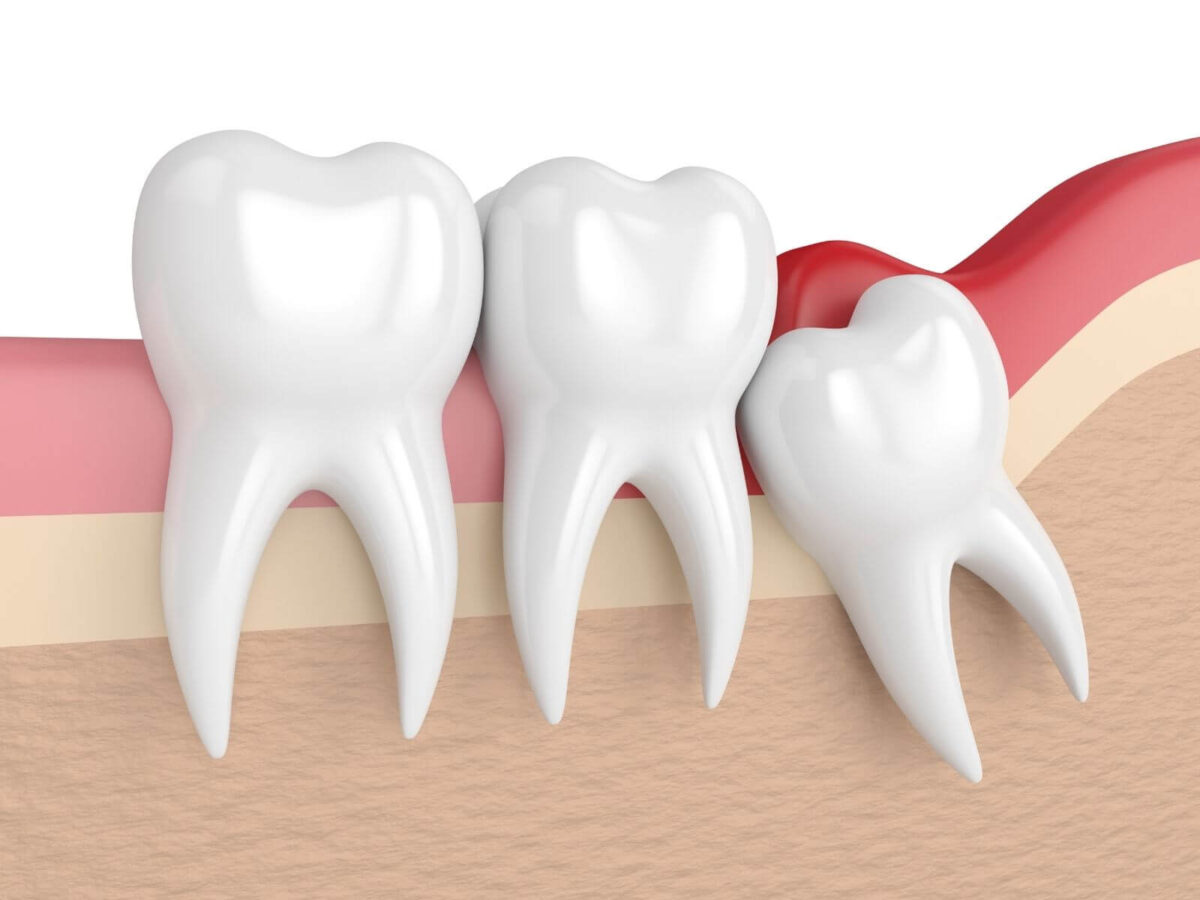Blog
Dental hygiene tips for healthy teeth & gums

Why Impacted Wisdom Teeth May Require Extraction
Any tooth that has not come from an early eruption is categorized as a wisdom tooth, and this is the third tooth in a row of the rear molars. The remaining teeth come through while you are still young. For instance, the lower central incisors or the first two front teeth start showing through your gums when you are six or eight months old.
Unlike the other teeth, there is more time between the third molars, which first emerge as wisdom teeth. As for those teeth, you only began growing them between 17 and 25.
What is Impacted Wisdom Teeth?
Wisdom teeth get impacted whenever they cannot come through the gums enough or if they develop in the wrong position. For those with small jaw bones, the first two molars can only grow in a bit of space; on the other hand, the wisdom teeth do not even have this space to develop. However, this does not prevent the wisdom teeth from growing within the gum tissues.
Sometimes, the wisdom teeth are impacted; this means they remain in the gums, pressing or abutted up against the second molar. Sometimes, the upper wisdom teeth erupt at the very back of your mouth, while the lower ones may grow backward into your mouth. Its development also depends on areas like how much space is left, the shape of the jaw bone, the strength of the teeth in the area, and more.
Symptoms
An impacted wisdom tooth can result in several issues. These include:
- Gum or Jaw Pain
- Red, Swollen Gums
- Pressure
- Discomfort
- Infection
- Cysts
- Damage to adjacent teeth
- Tooth Decay
- Gum Disease
Moreover, when wisdom teeth are crowded to specific teeth, they put pressure on them, resulting in misaligned teeth. A person may require braces due to the wrong alignment of his/her teeth. This may grow to become a sac within the jawbone, containing a fluid, forming a cyst. The cyst canula affects the adjoining jaw and teeth as well as nerves.
Sometimes, a benign tumor can grow, requiring tissue and bone surgery. The second molar, next to the third molar, known as the wisdom tooth, becomes more susceptible to infection if an object is pressing against it. Because of its location, it can be more vulnerable to infections, which can lead to:
- Bad Breath
- Earache
- Headache
- Strange taste in the mouth,
- Toothache
- Inflamed gums, which may well be another shade of red, are a
- clear sign of gingivitis.
- Swollen Jaw
- Bleeding Gums
Why Do People Need To Have Their Wisdom Teeth Removed?
The most important reasons for extraction are:
Make More Room In The Jaw For Other Teeth
There is insufficient space in the jaw, and they are closely associated with the nervous system.
At one time, wisdom teeth were crucial in eating, especially the digestive process. The third molars became a minor asset when we progressed and started using heat or making our food soft by chewing.
When man lost its functions, the size of the human jaw began to reduce gradually. This has led to crowding teeth in the mouth, and the third molars are not very useful at all, even if they do not grow properly.
Wisdom teeth bring a lot of harm, and scientifically removing them enhances spacing, allowing a patient to guard teeth against harm. It may also be needed during orthodontic treatments where mal-aligned teeth are a concern, following the removal of the third molars or the wisdom teeth.
Wisdom Teeth are Impacted
The situation with the affected wisdom teeth may seem nondangerous as they have not even partially emerged through the gum, but they may become a relatively severe issue. Partially or fully impacted wisdom teeth are likely to start growing horizontally, pressing up against the second set of molars and causing damage and pain to the teeth.
Even partially erupted wisdom teeth can cause gum disease or infections since they leave the gums gaping without ever emerging typically. Dentists then suggest the removal of the third molars to address specific effects from the impacted teeth or to head off potential problems.
Factor in Worsening Oral Health-Related Issues
Although there are no symptoms such as crowding or the inability of the teeth to bite down properly, dentists may advise the removal of wisdom teeth to decrease the chances of any oral health problems altogether. This is also why most dentists may remove wisdom teeth if the teeth have cavities.
Removing knowledge teeth before discomforting or problematic symptoms emerge could prevent the onset of more severe issues and enhance the patient’s overall dental health much more quickly.
The following are the main possible risks that may occur when a wisdom tooth is being removed:
- Bleeding
There may be a little blood at the extraction time, but this usually stops quickly and is unlikely to be a problem. If you are at home and the area bleeds again, this can generally be controlled by digital pressure over the bleeding site for at least 10 minutes with a handkerchief or swab. - Taste Sensations of the Chin, Lower Lip, or Tongue Change
Two nerves about the lower jaw are positioned somewhat carelessly in the region of the two lowest wisdom teeth. The nerves can be closer to the wisdom teeth or very far from them. The lingual nerve has a sensation in your tongue, and the inferior dental nerve has a sensation in the lower lip and skin on the chin. Sometimes, they can become injured during the extraction of teeth or can suffer from bruising.
If this occurs, you can experience pins and needles or numbness in the skin above your chin, lower lip, tongue, or any combination. The risk to the inferior dental nerve is less than 1% if the wisdom tooth is far from the nerve; nevertheless, it can reach 9% if the nerve is nearby. Less than 0.5 percent of the lingual nerve is at risk. This could take up to 18 months to heal. In rare cases, the nerve might not fully recover, leaving you with tiny numb spots on your chin or lip. Rarely is taste impacted.
Final Thoughts
An impacted wisdom tooth is what dentists call when a wisdom tooth does not emerge from the gums correctly. This may lead to swollen gums, jaw and gum pain, and overall discomfort.
An individual can use an antimicrobial mouthwash, saline mouthwash, or pain medicines to assist in alleviating these symptoms.
When an impacted wisdom tooth appears, a person should see a dentist like Grangerland Dentist TX, who will recommend extraction. To prevent issues like dry sockets, a patient should adhere to all post-operative care instructions given by the dentist.


